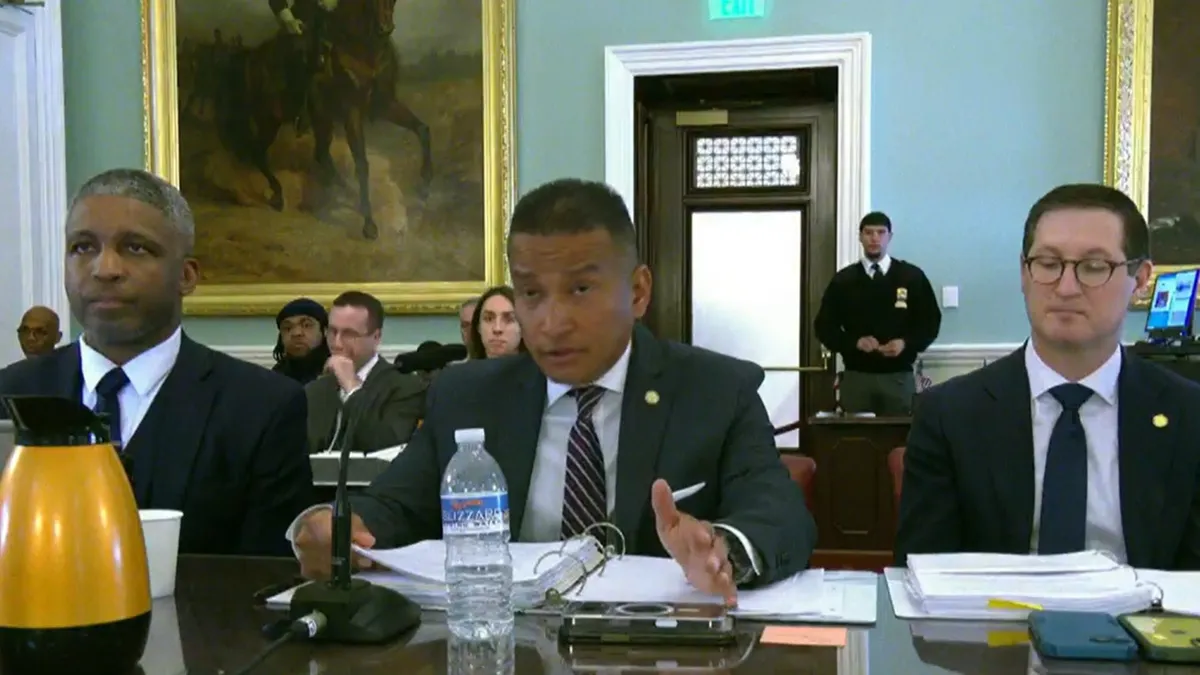Cleveland intends to move forward on an opt-in curbside recycling program after being without pickup service for nearly a year.
The city used to have weekly recycling collection for all households but failed to reach an agreement on a new contract by last spring — which it attributed in part to an "excessive" 62% contamination rate, about three times higher than in comparable communities. Cleveland subsequently landfilled recyclables before commissioning a review of all waste collection operations by consultant GT Environmental, which shared a report with city leadership in January that was recently made public.
That report outlined three different tracks forward to revamp trash, recycling, bulk and yard waste collection in Cleveland. One was considered a "High Diversion/High Investment" menu of options, a second was "Mid-Level/Low Investment." A third option — which the city's Division of Waste Collection and Disposal recommended — is labeled "Reset & Re-Build/Low Investment" and advises opt-in or targeted recycling, as opposed to automatic weekly or biweekly service.
The city believes benefits of a biweekly, opt-in approach will include reduced contamination and more efficient residential routes. It's also projected to be less costly. In outlining key performance indicators (KPIs) for the different paths forward, the GT report pegs the operating cost per household per month at $17.94 for the low investment track, versus $20.11 and $24.70 for the increasingly involved, biweekly and weekly counterpart plans. The report notes that the ultimate costs will be determined following a bid process.
Additionally, the city accepted a recommendation that under the new system there be six "Super Center" dropoff sites for curbside recyclables as well as special materials including tires and appliances; currently, the city only has two dropoff sites that accept curbside materials, according to the report.
The city did not comment in time for publication about when there might be a new request for proposals to service such a collection program. But the city did endorse recommendations to "include in any future recycling processing contracts that the processor must financially assist with recycling education to residents," according to the report. It also accepted a recommendation suggesting that the city include new program details and performance in a revised RFP for processing of collected recyclables, which "will be crucial in attracting multiple proposers and competitive pricing," and that the RFP ask for one revenue sharing option and one without.
Additionally, a Feb. 23 update from the office of Mayor Frank Jackson said that residents interested in information about the opt-in program would "soon" be able to sign up through the city website, and residents who do not participate will have blue bins taken away. The city anticipates GT Environmental will provide detailed implementation strategies this spring for that and related program updates.
The opt-in approach
In recent years, rising costs have prompted a range of different municipal strategies to still recycle some materials while in some cases moving away from weekly curbside pickups. Options may include every-other-week or monthly pickups, opt-in pickups, or a dropoff-only system.
The Recycling Partnership (TRP), a nonprofit that aims to bolster participation in local curbside recycling programs across the U.S., last year reported that programs with automatically provided service generated an average of about 459 pounds per household annually, based on survey data. By comparison, the average was 331 pounds in programs requiring subscription or opt-in.
The report in Cleveland acknowledges an expected lower participation rate of 25% under the opt-in system, versus 50% and 72% for potential biweekly or weekly services. The program's overall recycling diversion rate is estimated to be 3.9% under an opt-in system, compared to 7.8% or 11.3%. By comparison, the city's existing program had a 79% participation rate and 7% diversion rate. As stated in the report, the city could grow its opt-in rate over time through education.
TRP does not believe opt-in programs are the most equitable choice. Chief Community Strategy Officer Cody Marshall described opt-in programs as a "last resort," and noted that when there's an extra step involved, it may be human nature to "default to not doing it."
Marshall also thinks some of the perceived benefits to opt-in may be overblown. "We don't know if there's lower contamination with opt-in. In theory that makes sense, but we don't know that for a fact. It takes a lot of education for opt-in services, it takes a large budget to really run opt-in service well," he said.
It's important to allocate some of that budget to consistent communication and education for customers, said Marissa Segundo, a senior communications strategist at consultancy Resource Recycling Systems (RRS), noting those communications programs can sometimes be on the chopping block when it comes time for budget cuts.
"Recycling communication needs to be ongoing, and should be invested in in the same way that you're investing in operational equipment," she said. "So if you have a truck, you're going to make sure that [it] goes into the shop. [Similarly], with recycling communication, you're going to want to make sure that you're researching what your residents are understanding as far as messaging, [and] coming out with new messages, especially if you've got a contamination issue."
Cleveland does have a contamination issue — a big one. Around the time its processing contract with Kimble Recycling & Waste Disposal Co. was to expire in April 2020 there were no initial applicants for the bid. One unidentified company bid after a second call, but the city did not pursue it due to a price of $200 per ton which would cost $6 million annually.
Amid the 269-page report is a comparison to certain cities with non-subscription collection programs and similar demographics or characteristics to Cleveland, including their contamination rates. Milwaukee and Madison, Wisconsin, each came in at 19% contamination rates. Nashville, Tennessee, came in at 29%, and Lexington, Kentucky, at 34%. Cleveland far outpaced nearly all with a stated rate of 62%.
While only about half of the U.S. population has access to automatic curbside recycling, Cleveland is currently among the largest cities without any collection program in place. Cleveland's program was still intact last year at the time TRP released a report on the state of curbside recycling highlighting cities where curbside recycling is ripe for expansion. Among that list is Nashville, which currently has monthly pickup that TRP would like to see become biweekly. Additionally, Birmingham, Alabama; Baltimore, Maryland; Kansas City, Missouri; and Syracuse, New York, all have bin-based collection that could transition to cart-based collection.
Outside of the recycling structure, Cleveland's Division of Waste Collection and Disposal also greenlit recommendations to distribute an updated Waste Collection & Recycling Service Guide to all households in the service area, updates its website with accurate program information and resources for proper waste disposal and recycling, and update waste, recycling & bulk collection routes.





















